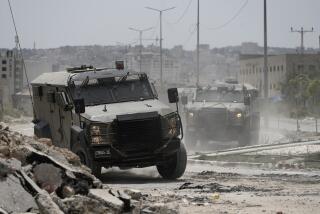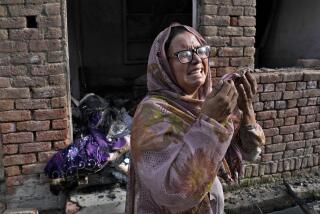4 Die in Coalition Raid on Baghdad Mosque
- Share via
BAGHDAD — U.S. and Iraqi forces stormed a well-known mosque in the capital on Friday, continuing the crackdown on Sunni Muslim religious and political leaders suspected of supporting the insurgency.
The daytime raid on the Abu Hanifa Mosque threatened to further alienate the country’s disgruntled Sunni community, just as officials try to coax the former ruling minority into taking part in elections scheduled for the end of January.
Iraqi national guard troops, backed by U.S. soldiers, surrounded the mosque in the Sunni neighborhood of Adhamiya. The raid occurred just after Friday afternoon prayers when the mosque was packed with worshipers, who resisted. Four died and nine were wounded in the clash, witnesses said.
The incident added to the growing pressure to postpone parliamentary elections because of widespread violence. At a conference of major political parties, senior members of interim Prime Minister Iyad Allawi’s government questioned whether the Jan. 31 deadline could be met.
“I am with the delay of the elections,” said Mohsen Abdel Hamid, head of the Iraqi Islamic Party, which withdrew from Allawi’s government over the bloody conquest of the insurgent-held town of Fallouja. “The security situation does not make it possible for the Sunnis to vote.”
The conference, which ended Thursday, brought together representatives from most of Iraq’s major political parties -- including Kurds, Shiite and Sunni Arabs and Communists. Although it was the Sunni delegates who openly called for delay, a statement released by the participants called for a study of electoral preparations.
Insurgent violence continued to erupt around Iraq on Friday. A car bomb attack against police cars in the east Baghdad neighborhood of Zeyouna killed at least three people and wounded 13, according to news reports.
In Mosul, clashes between insurgents and U.S. and Iraqi forces continued. Coalition troops earlier this week took back all five of the northern city’s bridges, but insurgents continued to launch ambushes.
As security forces work to root out insurgents, the government has begun pressuring imams to stop using sermons to incite anti-coalition or anti-government sentiment.
Friday’s raid on the Abu Hanifa Mosque targeted one of Baghdad’s most important Sunni sites and a platform for anti-U.S. preaching.
The Muslim Scholars Assn., a staunch opponent of the U.S. presence, said in a statement that during the raid, Iraqi soldiers lobbed percussion grenades, broke down doors, took computers and then, when faced with an angry crowd, opened fire with live ammunition. “They are just provoking us,” said spokesman Sabah Jaff. Three prominent Sunni clerics have been arrested in the past week, along with senior members of the Iraqi Islamic Party.
An Iraqi Interior Ministry official, speaking on condition of anonymity, said the government was clearly “going after the clerics.” The move, he said, was based on the belief that many hard-line mosques were being used to store weapons and shelter insurgent fighters.
“We tried every other way, and the government appeared to be weak,” the official said. “You’ve got to do it strongly because there’s no dialogue with these people.”
The crackdown also extends to Shiite critics of the government.
Sheik Kadhim Nafie, a representative of radical cleric Muqtada Sadr, was arrested Friday in the southern town of Husseiniya, near Karbala. It was the second arrest of a Sadr associate in as many days.
Meanwhile, in Baghdad’s Umm Qura Mosque, another Sunni stronghold, Sheik Ahmed Abdel Ghafour condemned U.S. operations. “They want to deliver democracy and elections to the Iraqis, but ... this democracy is brought with tanks and blood,” he said.
Special correspondents Saif Rasheed and Caesar Ahmed in Baghdad and Times wire services contributed to this report.
More to Read
Sign up for Essential California
The most important California stories and recommendations in your inbox every morning.
You may occasionally receive promotional content from the Los Angeles Times.












